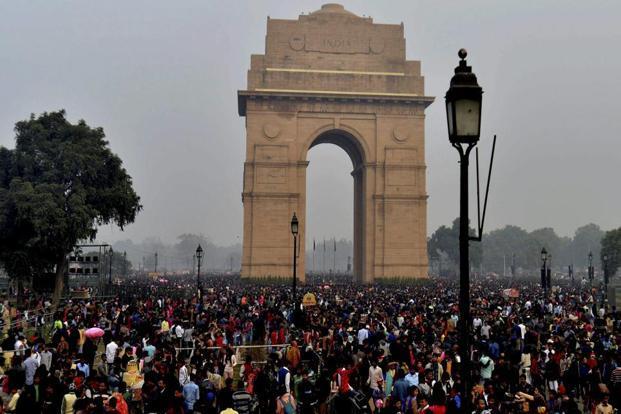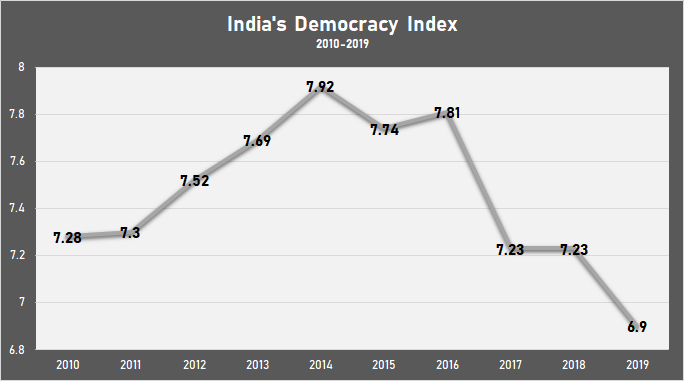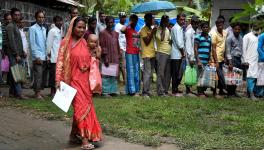Annual Democratic Index: India Ranks 51, Worst Performance Ever

Image for representational use only.Image Courtesy : Livemint
India dropped 10 places in the latest Democracy Index released by the Economist Intelligence Unit, and retained its status as a “flawed democracy”. The country was ranked 51 on the index for 2019 – its lowest since the rankings began in 2006. The report stated, “The biggest democracy in the world, India, dropped ten places in the Democracy Index’s global ranking, to 51st place. India’s overall score fell from 7.23 in 2018 to 6.90 in 2019. The primary cause of the democratic regression was an erosion of civil liberties in the country.”
The annual Democracy Index released by the Economist Intelligence Unit is based on five categories: electoral process and pluralism, civil liberties, the functioning of government, political participation and political culture. The index ranks countries based on their scores on 60 indicators, and then classifies them as one of the four types of regime: full democracy, flawed democracy, hybrid regime and authoritarian regime.

Talking about the decrease in India’s Democratic Index, the report said, “The primary cause of the democratic regression was an erosion of civil liberties in the country. The Indian government stripped the Jammu and Kashmir (J&K) state of its special status by repealing two key constitutional provisions granting it powers of autonomy. Article 370 gave the state assembly of J&K powers to decide which articles of the Indian constitution would be applicable in the state—except for matters related to defence, communication and foreign affairs.”
It added, “Furthermore, Article 35A prevented Indian residents from other states from purchasing land or property in J&K. Following the removal of these provisions of the constitution and the passage of a new Jammu and Kashmir Reorganisation Act of 2019, J&K no longer enjoys statehood and is now divided into two union territories: one that retains the name Jammu and Kashmir, and Ladakh. Ahead of the move, the government deployed a large number of troops in J&K, imposed various other security measures and placed local leaders under house arrest, including those with pro-India credentials. The government also restricted internet access in the state.”
The report said that the NRC also played a role in the stark decrease in India’s score. It said, “A separate citizenship registration exercise in Assam, a state in north-eastern India, has excluded 1.9 m from the final list of the National Register of Citizens (NRC). The vast majority of people excluded from the NRC are Muslims. The ruling nationalist Bharatiya Janata Party (BJP) says that most of the people excluded from the list are immigrants from Bangladesh, whose government denies this. Critics claim that the exercise targets the Muslim population and will lead to demographic changes along religious lines.”
It pointed out that there are almost 200 million Muslims in India: the figure was 195,810,000 in 2015, representing 14.9% of the total population of India and 10.5% of the total Muslim population of the world, according to a report by the Pew Research Center. At current growth rates, India will be home to the world’s biggest Muslim population by 2060, with the count reaching 333 million or 19.4% of the total population. It said, “The new citizenship law has enraged the large Muslim population, stoked communal tensions and generated large protests in major cities.”
Only 22 countries, with a combined population of 430 million, were classified as “full democracies” in 2019, 53 countries were classified as “flawed democracies”, and 37 countries had “hybrid regimes”. Fifty-four countries, which make up for a third of the world’s population, were found to be living under authoritarian rule.
Norway recorded the highest democracy index, while North Korea was at the bottom of the list.
The report called 2019 ‘a year of democratic setbacks and global protest’. It stated, “In the 2019 Democracy Index the average global score for democracy fell from 5.48 in 2018 to 5.44 (on a scale of 0-10). This is the worst average global score since the index was first produced in 2006. The 2019 result is even worse than that recorded in 2010, in the wake of the global economic and financial crisis, when the average global score fell to 5.46. From 2011 onwards the average global score recorded a gradual, modest annual improvement, but in 2015 and 2018 the score stagnated, and in 2016 and 2019 it declined.”
Also read: UP Police ‘Largest Organised Gang of Communal Criminals’ in Country: Prashant Bushan
Get the latest reports & analysis with people's perspective on Protests, movements & deep analytical videos, discussions of the current affairs in your Telegram app. Subscribe to NewsClick's Telegram channel & get Real-Time updates on stories, as they get published on our website.
























